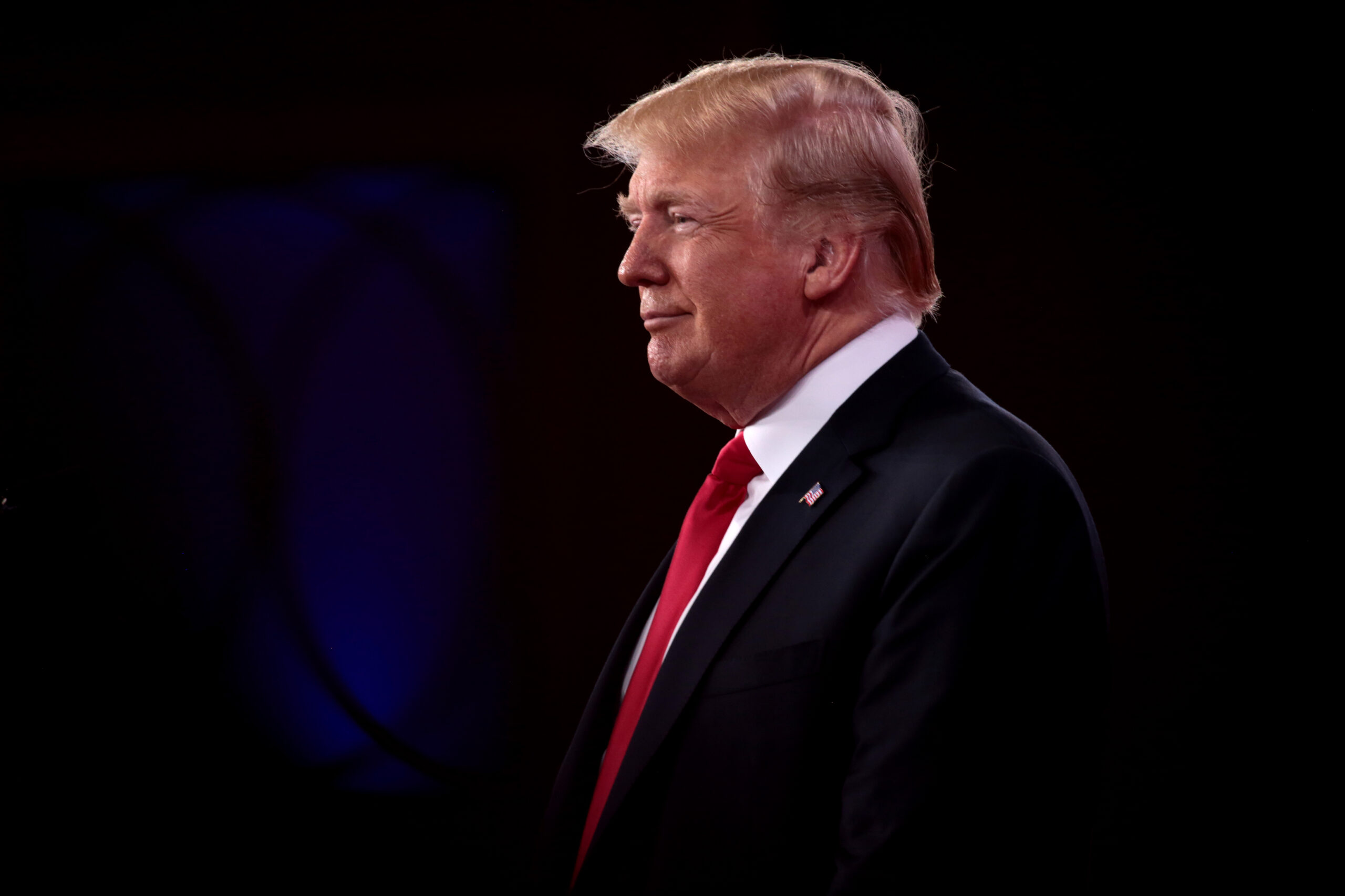Trump impeached, USF professors weigh in on his last days in office

With less than a week until President-elect Joe Biden’s inauguration, the country endures an eventful week consisting of safety concerns across states and impeachment procedures as President Donald Trump’s final days in office come to an end.
Trump became the first president in U.S. history to be impeached twice by the House of Representatives on Wednesday afternoon after inciting a mob of his supporters to invade the Capitol on Jan. 6. While the impeachment could have “a very little impact” in the short run, assistant professor at the School of Interdisciplinary Global Studies Nicolas Thompson said it will have significant long-term impacts.
He said the impeachment will most likely not remove Trump from office before the end of his term, but once the Senate trial begins, he said there could be subsequent actions, especially if the Senate votes to prevent Trump from running for federal office again in the future.
“Seems like it’s going to have a minimal practical impact, but the historical impacts can be very large, especially if Republican senators ultimately come around and vote for removal and vote to bar him from future federal office holding,” he said.
The milestone of a second impeachment, according to Thompson, left a “sour note” on Trump’s final days in office.
“It’s hard to gauge exactly … the implications of him being impeached twice will be,” Thompson said. “[Historians and political scientists] already viewed Trump as among the very worst presidents in American history. So it might have solidified his position … and it’ll certainly add kind of another dramatic checkpoint or two to his presidency.”
For Thompson, Trump’s second impeachment will send a message to future presidents, emphasizing that such actions are “not within the bounds of what’s accepted in American politics.”
“It’s utterly unprecedented of having a president incite a riot right toward the nation’s Capitol and the other elected officeholders,” he said. “So, it’s unclear whether the second engagement itself is going to seal the deal or not. The point that he incited the insurrection at the Capitol, that’s going to be kind of the most important thing.”
The mobs that stormed the Capitol forced the government to take precautionary measures to protect the safety of lawmakers and secure and maintain order in the city as the presidential inauguration gets close. In preparation for Jan. 20, the FBI sent warnings to local law enforcement agencies across all 50 states about the potential occurrence of armed protests close to Inauguration Day.
Thompson said the country will see a very robust federal police and military presence to secure Inauguration Day and prevent violent protests from occurring. While Washington, D.C. will significantly implement security measures in the upcoming days, he said he’s concerned with the safety of major cities across the country.
“As far as the 50 state capitals go though, I think that’s a scary question and honestly, they have much less resources obviously than the federal government does,” Thompson said. “The states do have access to their own National Guards, a lot of state-level politicians, state-level governors, state legislators have aligned themselves with the president, especially in red states, so it’s unclear how they’re going to be able to respond.”
In case what happened at the Capitol occurs again, Thompson said it will most likely be at the state level rather than the national level.
“It will take an incredible amount of planning, I think, and manpower to overcome the assets that the federal government has deployed around the Capitol at this point,” he said. “It remains to be seen whether or not they’ll be able to also secure the different state capitals.”
Professor in the Department of Government and International Affairs J. Edwin Benton believes every state will be ready to act in case violent acts are incited.
“Well, I think, not only is Washington going to be prepared but every state capital, and maybe even if it occurred in Tampa, St. Pete … Different radical groups could go and protest or instigate violence there, but I think with the proper heads up and the horrible lesson from a week ago, they’re all going to be prepared,” Benton said.
“I think authorities are bracing for the worst.”
Benton said he’s concerned with national security issues after the recent events that took place in the Capitol. He said the current polarization and instability across all 50 states are making the country “vulnerable” to not only internal conflicts but also external conflicts.
“There are deep concerns I have for the nation and first and foremost on national security … it’s very scary. It’s like no one’s in charge of the United States, it’d be a perfect time for us to be attacked,” Benton said.
“The country was like on autopilot and that’s scary. We can’t allow that to happen.”
Despite having less than a week until the inauguration, Benton said he’s still worried about the coming week and what might happen in between.
The 2020 presidential election was flooded with disputed claims of widespread voter fraud, which both the Department of Homeland Security and the Justice Department found to be baseless, according to an AP News article from Dec. 1.
While claims about voter fraud have been an issue in previous elections, Thompson said Trump lit an even bigger fire, leading to broader disbelief in the accuracy of the presidential election, as well as the denial of Biden’s win, among his supporters.
“Republicans have been alleging widespread voter fraud for decades and it’s always been kind of, not necessarily widespread to the extent that they’re alleging in this election that they’re seeing massive coordinated election fraud across four key states, but they’ve always, for decades, they’ve been claiming that undocumented immigrants, for example, are voting without providing any evidence,” he said.
While Biden will focus on uniting the nation, the current polarization will make his efforts more challenging, according to Benton.
“The political parties are so polarized,” he said. “I don’t see in the immediate future them coming together. But I think if Donald Trump were out of the way, impeached and convicted and removed from office rather than just to retire to Florida on his own, I think that could help the situation.
“Others disagree and say, ‘that would increase the division,’ but sometimes you have to cut out the cancer sore to kill the cancer.”
Trump’s second impeachment, according to Benton, will “leave a stain” on his presidency.
“[Trump] would … set a historical record and no one likes to lay claim to the only president who has been impeached twice,” he said.
“The best thing for the country and for a Republican Party is to get rid of him.”
Benton said the Republican Party is in disarray, describing it as if it was fighting an internal “civil war” while lowering its chances of regaining power in future elections.
“Trump’s group and the anti-Trump group, which represents the mainstream Republican Party, they have got to find out who they really are … the Republican Party is on life support now. It’s in deep trouble.”
“[Trump] hijacked it for his personal and his political gain and other reasons. [He] not only lost the White House, [but] the Democrats are also still in control of the House of Representatives and [he] lost the Senate. All in one election. And so, the Republican Party is those that remember what the Republican Party was prior to Donald Trump.”
Thompson said the coming years will be a crucial time to rebuild the Republican Party for future elections.
“We’re going to see a battle for the soul of the Republican Party,” he said.
“I think this is going to cause a real rift among leaders within state-level Republican organizations across the country and how much they want to remain tethered to Trump, and how much they want to search out a different identity or maybe have returned to a more Reagan-style Republican Party.”
Benton emphasized the importance of checks and balances under the country’s democracy. He said the country depends on a strong, two-party system in order to have an appropriate counterbalance to “keep parties in check.”
Without a strong Republican party, Benton said the country would have limited options in who to vote for. Unless its focus is regained, Benton fears a long-lasting impact in the party’s future elections.
“We need a strong Republican Party to provide that counterweight and to give the public more options,” Benton said. “After all, that’s why we criticize the countries that are communist countries and totalitarian regimes [where] you have only one person [and] one party to vote for. So we need a strong second party, and the Republican Party is going to have a gut check now.
“[Republicans] have got to say, ‘Who are we? Can we get back to what Republican Party stands for, and not to go so far as to feel we don’t even recognize who we are. We are the party of Trump. We’re not the Republican Party,’ and they must get away from that image and that reality or the Republican Party may be short-lived.”
Once the new administration takes over, Benton said he is confident there will be more collaboration, rather than division, among both parties.
“I am hopeful that the Biden administration will be able to pull the country together, to say ‘OK, put down our war hatches [and] let’s talk. We may never agree, and that’s OK, but we’ve got to agree to some policies for the good of the country,’” he said.
Thompson said Biden will act as an “uniter,” amid the country’s polarization as well as the coronavirus crisis. He described Biden as a “moderate” to “conservative” Democrat.
“I think he’s going to do whatever he can to try and unite the country and reach out to Republicans, especially the Republicans that he worked with for so long in the Senate,” Thompson said. “We should anticipate seeing a good faith effort forward by future President Biden or President-elect Biden, but it all depends on how it’s ultimately received by the other side, whether … any of the people within the Republican Party are willing to … go along with it or accept the legitimacy of it.”






